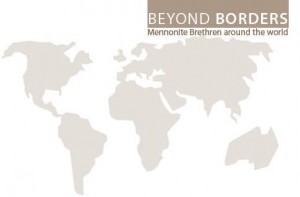The MB family of faith includes people from all walks of life, and all corners of the globe, as recognized in the International Community of Mennonite Brethren (ICOMB). This month’s international columnist shares his story from Austria.
My mother became a Christian when I was five years old. She then joined the Mennonite Brethren Church in Linz and started to take me along to Sunday school. So I basically grew up in this church and have considered myself a Mennonite as far back as I remember. I should add, though, that I only consciously accepted Christ as my Lord and Saviour at 17, when I also got baptized and became a member of the church. This was more than 40 years ago.
At that time the vast majority of Austrians were either Roman Catholic or Lutheran. (Today, Islam is the second largest religious affiliation in Austria, surpassing the Lutheran church in size.) Everything else was considered a sect. Even today, most Austrians would put a Mennonite in the same category as a Mormon. When I was in high school I knew of only two students who were not Catholic or Lutheran – a son of Jehovah Witnesses and me, both members of a sect in the eyes of all the other students.
Although the situation has improved quite a bit since then, several challenges remain the same.
First, the average Austrian considers him- or herself a Christian. This makes it nearly impossible for them to really become Christians. Only non-Christians can become Christians. As one American missionary in Austria once wrote in his prayer letter: Thank God that the first Christian has become a non-Christian! Once an Austrian realizes that he or she is not a Christian in the biblical sense, in spite of being a member of one of the state churches, the door is open to
become one.
The second problem is a wrong understanding of who Christ is. A friend of mine once asked a student to describe the Jesus he did not believe in. When the student finished describing his Jesus, my friend could only agree; he did not believe in that Jesus either.
Roman Catholic Austrians in particular often know only a helpless Jesus – either in the arms of his mother or hanging on the cross. As Mennonites, we believe in a different Jesus. Yes, he hung on a cross for a few hours, but he did not remain there. He is risen and is Lord of lords and King of kings.
This brings me to the biggest challenge of being a Mennonite in Austria, or a member of any evangelical denomination. The Jesus that people commonly think of has nothing to do with everyday life. Jesus has to do with religion, and religion only has to do with certain days or even hours. As witnesses of Jesus, we not only have to explain the difference between Jesus and religion with winsome words, we also have to demonstrate Christ’s lordship in every aspect of our day-to-day work and personal lives.
Over the last few decades, it has become more acceptable, even in Austria, to believe differently than the majority. The effects of postmodernism have reached Austria as well. It is okay for someone to believe in Jesus if it helps to live a happier life, but he or she should not insist that Jesus is the only way to God.
So, it is not as difficult as it once was to confess Jesus as Lord. Now the challenge is to confess him as the only Lord.
 fgang Binder is an elder at the MB
fgang Binder is an elder at the MB church in Wels. He and his wife Erna joined Wycliffe Bible Translators in 1974 and worked in the Philippines for 4 years. Now he is the director of Wycliffe in Central and Eastern Europe and of Wycliffe Austria as well. He has an MA in global Christian studies from Providence Theological Seminary in Manitoba.
____________________________________________________________________
In the early days of Anabaptism, Austria was a hotbed of both evangelistic activity and strong state persecution, particularly in 1527–1528. The intense persecution soon led to migration to Moravia or Bavaria. Though an Anabaptist beheading is recorded as late as 1605, by the end of the 16th century, Anabaptism had disappeared as a living force from Austria. World War II created opportunity for Mennonite Central Committee to do relief work in Austria, and the MB mission agency sent workers to refugee camps. Linz became the first MB church centre, and the mission work expanded to other cities, including a related work in Vienna, called Tulpengasse. A joint Bible school of evangelical churches in Austria was established in Ampfelwang in 1983.
 The MB family of faith includes people from all walks of life, and all corners of the globe, as recognized in the International Community of Mennonite Brethren (ICOMB). This month’s international columnist shares his story from Austria.
The MB family of faith includes people from all walks of life, and all corners of the globe, as recognized in the International Community of Mennonite Brethren (ICOMB). This month’s international columnist shares his story from Austria.